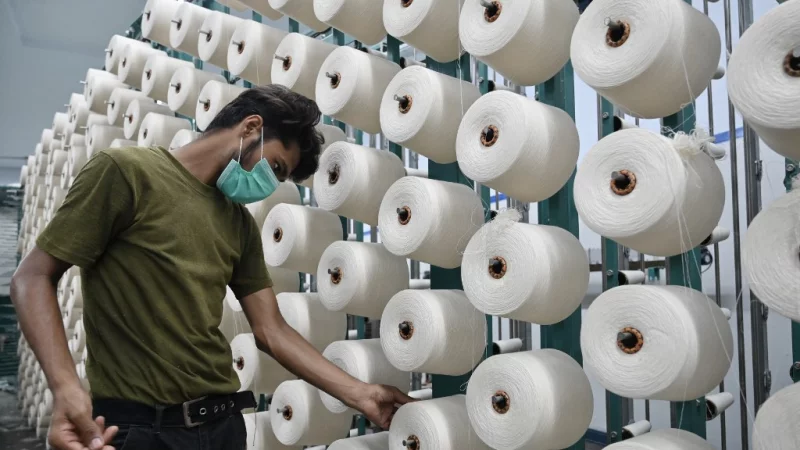
Pakistan’s cash cow textile sector that brings foreign exchange to the country is starving, said the industry, blaming the policies and decisions of the Islamabad government. The textile industry which supports a significant employment generation and supports the national economy is in distress due to the declining exports in recent years. The important sector for Pakistan’s economy is already marred by liquidity crunch, energy shortage, and higher taxes on manufacturing.
The All Pakistan Textile Mills Association (APTMA) has opposed the latest increase in taxes saying it would be “extremely regressive” that can lead to the collapse of the sector and its exports. “The budget is based on extremely regressive tax policies,” it said. Seeking measures to avoid the collapse of the textile sector, the APTMA said “Failure to do so will have catastrophic implications not only for the textile industry but for Pakistan’s entire economy and society.”
The textile sector of Pakistan has been facing several problems at the production and export levels. Textile exports declined by 15 percent in the year 2022-23, leading to losses of USD 2.8 billion. The situation did not seem to be improving, as exports has fallen by 5 percent in the first half of 2023-24. The beginning of year 2024 too has not been promising. Exports in February declined by 3.31 percent compared to that a month ago.
Liquidity crunch has negatively impacted the textile sector, resulting into lower exports. APTMA said the excess taxes would stamp out the incentives the textile received for export-oriented activities as well as drain all liquidity from low-margin high-volume industries. The liquidity crunch has led mills to delay payments to employees and cotton growers.
Energy shortage and high tariffs are major concerns voiced by the textile industry in Pakistan. It has been demanding a reduction in the power rates to avoid factory closures and job losses. The power rates saw an increase of up to 115 percent in the past six months. APTMA said the higher power cost had led to the closure of 50 spinning mills, 10 processing mills and hundreds of weaving units.
Economic catastrophe is eminent if power cost is not reduced said Shahid Sattar, secretary general of APTMA. “If left unchecked, the continued escalation of energy costs will not only deepen the crisis in key sectors such as textile but also imperil the broader economic stability of Pakistan,” he said. “If the cost of an input increases beyond a threshold that pushes total cost of production above international prices, it is unable to compete in the international market and exits the business.”
The earning of the textile sector in Pakistan declined by 24 percent in 2022-2023 due to the higher financing costs, expensive cotton and increasing energy tariffs. Owing to the lower production, the rates of cotton in Pakistan have spiralled up, which impacted the textile industry negatively. It went up by 27 percent earlier this year. Adverse weather conditions, flooding caused by downpours, and consequent lower production are primary reasons for the cotton prices to go up.
Experts and businessmen associated with the textile business in Pakistan blamed the Islamabad government for its negligence and apathy for the critical condition of the sector. Energy expert Dr Shahbaz Khan said it was a “great fallacy” to seek remedies from the bureaucracy, which he said lacked subject knowledge and required corporate leadership experience. “The decades of negligence in conjunction with the exponential rise in prices of natural gas and electricity over the past 18 months appears to have finally placed the industry on ventilator,” he said.
Pakistan’s textile industry’s inability to adapt to the global transition from natural to man-made fibres has made matters worse, said economic analyst Muhammad Sheroz Khan Lodhi. He blamed the government for failing to guide the industry toward an innovation-centric sustainable textile model. “It is evident that the textile industry, one of the champions of Pakistan’s economy, is sadly enmeshed in neglect and apathy from the authorities that ought to be its strongest allies,” Lodhi said.






